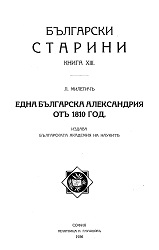
ЕДНА БЪЛГАРСКА АЛЕКСАНДРИЯ ОТЪ 1810 ГОД.
Published in 1936 by the Bulgarian Academy of Sciences (Department for History and Philology) as vol 13 of the series "Bulgarian Old Age" (БЪЛГАРСКИ СТАРИНИ, КНИГА XIII)
More...We kindly inform you that, as long as the subject affiliation of our 300.000+ articles is in progress, you might get unsufficient or no results on your third level or second level search. In this case, please broaden your search criteria.

Published in 1936 by the Bulgarian Academy of Sciences (Department for History and Philology) as vol 13 of the series "Bulgarian Old Age" (БЪЛГАРСКИ СТАРИНИ, КНИГА XIII)
More...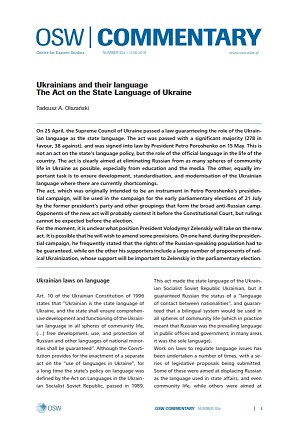
On 25 April, the Supreme Council of Ukraine passed a law guaranteeing the role of the Ukrainian language as the state language. The act was passed with a significant majority (278 in favour, 38 against), and was signed into law by President Petro Poroshenko on 15 May. This is not an act on the state’s language policy, but the role of the official language in the life of the country. The act is clearly aimed at eliminating Russian from as many spheres of community life in Ukraine as possible, especially from education and the media. The other, equally important task is to ensure development, standardisation, and modernisation of the Ukrainian language where there are currently shortcomings. The act, which was originally intended to be an instrument in Petro Poroshenko’s presidential campaign, will be used in the campaign for the early parliamentary elections of 21 July by the former president’s party and other groupings that form the broad anti-Russian camp. Opponents of the new act will probably contest it before the Constitutional Court, but rulings cannot be expected before the election. For the moment, it is unclear what position President Volodymyr Zelenskiy will take on the new act. It is possible that he will wish to amend some provisions. On one hand, during the presidential campaign, he frequently stated that the rights of the Russian-speaking population had to be guaranteed, while on the other his supporters include a large number of proponents of radical Ukrainization, whose support will be important to Zelenskiy in the parliamentary election.
More...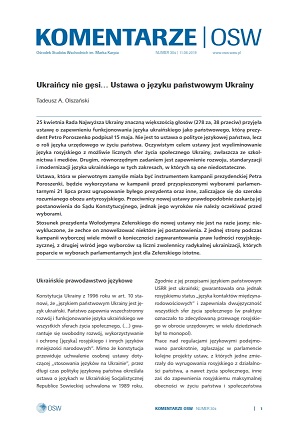
25 kwietnia Rada Najwyższa Ukrainy znaczną większością głosów (278 za, 38 przeciw) przyjęła ustawę o zapewnieniu funkcjonowania języka ukraińskiego jako państwowego, którą prezydent Petro Poroszenko podpisał 15 maja. Nie jest to ustawa o polityce językowej państwa, lecz o roli języka urzędowego w życiu państwa. Oczywistym celem ustawy jest wyeliminowanie języka rosyjskiego z możliwie licznych sfer życia społecznego Ukrainy, zwłaszcza ze szkolnictwa i mediów. Drugim, równorzędnym zadaniem jest zapewnienie rozwoju, standaryzacji i modernizacji języka ukraińskiego w tych zakresach, w których są one niedostateczne. Ustawa, która w pierwotnym zamyśle miała być instrumentem kampanii prezydenckiej Petra Poroszenki, będzie wykorzystana w kampanii przed przyspieszonymi wyborami parlamentarnymi 21 lipca przez ugrupowanie byłego prezydenta oraz inne, zaliczające się do szeroko rozumianego obozu antyrosyjskiego. Przeciwnicy nowej ustawy prawdopodobnie zaskarżą jej postanowienia do Sądu Konstytucyjnego, jednak jego wyroków nie należy oczekiwać przed wyborami. Stosunek prezydenta Wołodymyra Zełenskiego do nowej ustawy nie jest na razie jasny; niewykluczone, że zechce on znowelizować niektóre jej postanowienia. Z jednej strony podczas kampanii wyborczej wiele mówił o konieczności zagwarantowania praw ludności rosyjskojęzycznej, z drugiej wśród jego wyborców są liczni zwolennicy radykalnej ukrainizacji, których poparcie w wyborach parlamentarnych jest dla Zełenskiego istotne.
More...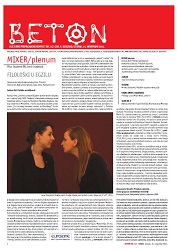
MIXER/plenum, Isidora Ilić: Politike nevidljivosti, Aleksandra Sekulić: Prilažem zapisnik, radna grupa za oslobađanje memorije svetlana gutić „cec“ i sava jokić: retrospektiva studentskog pokreta filološkog fakulteta; CEMENT, Saša Ćirić: Vakuum pumpica; ŠTRAFTA, Mirnes Sokolović: Viteškim stazama revolucije; VREME SMRTI I RAZONODE, Predrag Lucić: Milan Nedić, peto tri; BLOK BR. V, Aleksa Jovanović i Lazar Bodroža: Avanture zeca Milorada
More...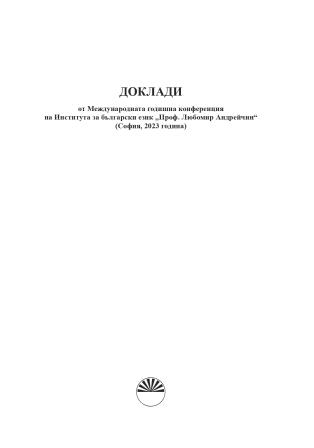
The article is dedicated to the practically unknown copy of the so-called Pseudo-Zonaras Nomocanon kept in the Library of the Saint Synod of the Romanian Orthodox Church in Bucharest under signature BSS Ms.sl.II 267. The historical context of its emergence and the metadata of the manuscript are studied in comparison with the traditions of this nomocanon in Wallachia and Moldavia after the 14th century, when the Bulgarian translation appeared. Separate Greek words and lexical variations are commented on, such as факеол-венец-савон; посадница, палакида, кавка, накато, some of them with a status of occasional readings for this special Moldavian copy. The author highlights the role of the 16th century Moldavian literature for the preservation of the Middle Bulgarian written heritage.
More...
The object of study in this article are the morphological peculiarities of the nominal system in the hitherto unattributed liturgical commentary of MSS RGADA 88 and Bogishich 52. On the basis of a thorough linguistic analysis linguistic data are gathered about the age in which the work appeared and the literary school to which its author belonged. This investigation shows that as regards its morphological characteristics, the commentary has the characteristic features of Southern Slavonic literature, which conform to the linguistic norms probably already established on Mt. Athos in the first decades of the 14th century and adopted by the Tarnovo men of letters as well, norms underlying the Resava orthography in Serbia later. Judging by the linguistic data examined, the commentary could have been written in the Western Bulgarian or the Eastern Serbian lands by an author who had a command of Old Bulgarian and observed its morphological and syntactic norms by using synthetic nominal forms at the time when the new analytical system had already established itself in the vernacular.
More...
The study is dedicated to the Hungarian loanwords in the Slavic kinship terminology. The linguistic material is collected from Volume XI Degrees of Kinship prepared by the Bulgarian National Commission as part of the Slavic Linguistic Atlas. The object of analysis are the loanwords of Hungarian origin in the Slavic dialect kinship terminology. The aim of the research is to show the source of the borrowings, the particularities of their adaptation, dialects where they are found. Special attention is also paid to Slavic loanwords adopted in Hungarian that have later been reborrowed into various Slavic dialects.
More...
The paper applies a systematic approach to the etymologization of Bulgarian dialect words of Turkish origin. The object of analysis are Turkish loanwords with initial a- from the Dictionary of an archaic Rhodope dialect – the dialect of Ropkata, published in 2022. Specific phonetic changes are described, whose regularity in the dialect helps to find other dialectal variants of the words under consideration and to identify the Turkish primary source. The analyzed words are not included in Volume I of the Bulgarian Etymological Dictionary, and the majority of them are not reflected in the corresponding entries of the Dictionary of Turkisms in Bulgarian, so they are related to the respective etymological word families for the first time. Clarifications, additions and corrections are made to some of the existing etymologies or a new etymological interpretation is proposed. Emphasis is placed on the variation of the borrowed dialect lexis, which is of great importance for discovering the foreign language etymon.
More...
In this publication, I revisit the origin of the Slavic ethnonym Croat, which does not have a generally accepted etymology, and the attempts at explaining it are numerous – from ancient times to the present day. I summarize the main hypotheses and present the most plausible one, which is accepted by most specialists today.
More...
The paper presents the results of several years of ethnolinguistic research carried out in cooperation between Slovak, Bulgarian, Russian and Serbian slavicists. It provides a picture of the perception of the relationship between truth, right, good and evil in the context of linguistic thought. It not only highlights language as a tool of communication but also explains the perception of language as an important feature of cultural and ethnic identity. The paper specifically addresses the issue of research on language as a source of deeper understanding of the study of the history of the language community. Language is also presented as an instrument of value formation for the cultivation of the individual and the community. Тhe study also outlines other areas of cooperation in the field of international linguistically-oriented Slavic studies.
More...
The article is devoted to the problem of semantic derivation in the field of euphemistic vocabulary. Euphemization is a dynamic phenomenon caused by linguistic and extra-linguistic factors. The replacement of linguistic taboos with euphemisms is based on the processes of secondary nomination, which involves the use of existing nominative means as new names of entities, processes, phenomena, actions. The creation of euphemistic vocabulary in Ukrainian and Polish is carried out through metonymic, metaphorical and functional transfers and generalization. Universal euphemisms in both languages arise due to the fact that most semantic models are formed by the same type of cultural codes, ones that are reflected in the language. Distinctive euphemistic nominations in Ukrainian and Polish define a specific view of the world, resulting from national and cultural factors and the historical development of the languages.
More...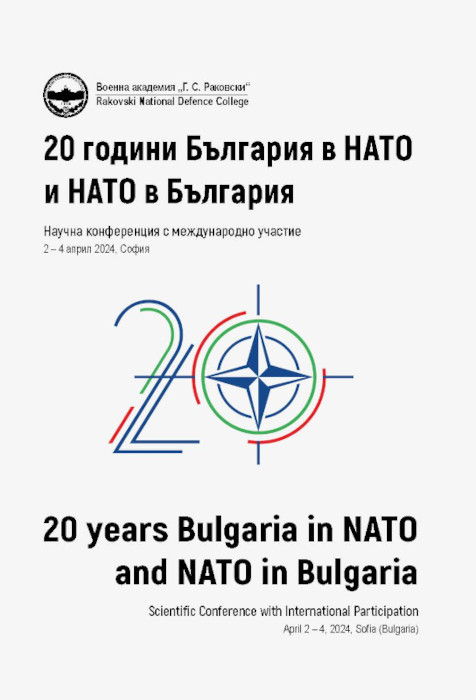
The article elucidates the role and significance of NATO activity in the process of the global spread of English as the means of international communication. It highlights the methods and directions of the Alliance activities aimed at the establishment of the global importance of the use of English in the field of international relations. The article analyzes the organization of language training for the military personnel of the Alliance member countries. The author presents the NATO standards of foreign language proficiency STANAG 6001. The main problems of language training in the Armed Forces of the North Atlantic Alliance are listed in the article and the means of their solutions are analyzed. The programs and strategies of military language education are presented as well as the ways of their integration into existing courses of professional military education. The paper analyzes the importance of the Defence Education Enhancement Programme and its interoperability for the allies and partners.
More...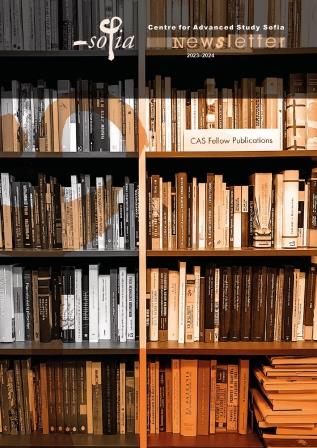
Articles, pictures and interviews can be reprinted only with the consent of the publisher.
More...